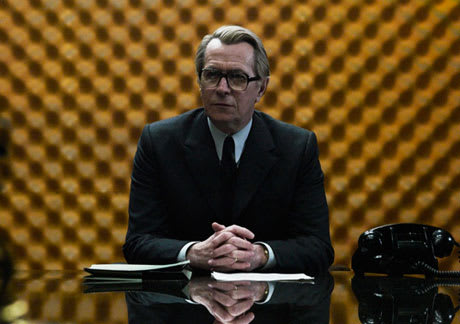With cleverly placed, seemingly incidental signage lining '70s London reading, "Women are the Future" amidst paranoid warnings of looming eyes, Tomas Alfredson's (Let the Right One In) adaptation of the exceedingly dense and complicated John Le Carré novel, Tinker, Tailor, Soldier, Spy, is as much about background and atmosphere as it is about British Intelligence. Deftly orchestrated, smartly cast and impressively subtle, this low-key espionage thriller transcends its showy, often expository genre by respecting the viewer and retaining ambiguity, something that will surely limit its audience.
This inevitability is somewhat ironic, considering that this impressively compressed adaptation simplifies Le Carré's source story of MI5 and -6 spymasters (codenamed Circus), removing secondary subplots and combining characters to make ousted agent George Smiley's (Gary Oldman) investigation of a possible high ranking mole more accessible. Similarly, the time-shifting narrative utilized in the acclaimed BBC miniseries is clarified, flashing back to the botched mission in Hungary, where the undercover Jim Prideaux (Mark Strong) was shot in the back (or stabbed in the back, if we analyze the metaphor) in the line of duty only after some context is laid.
The rest of the story is revealed in the same manner, with ex-agent Smiley interviewing various members of the Circus after AWOL field agent Ricki Tarr (Tom Hardy) unveils some information that corroborates the mole theory conceived by Smiley's superior, Control (John Hurt), who has long since been replaced by the ambitious Percy Alleline (Toby Jones).
Within this increasingly labyrinthine plot, there are hints of homosexual allegiances, marital infidelities, feminine wisdom and a smart look at the pain of wisdom and resultant isolation. Each capable actor brings their disposition and ideology to life through reaction and allusion rather than overt performances, exaggerating the washed out, strangely defeatist aesthetic and tone.
Alfredson's observational, voyeuristic eye works well to exacerbate the overall sense of paranoia, similarly exploiting set design as an indicator of character with reflective surfaces, taking on the oppressive and outdated wallpaper patterns. Defined by male ambition and exploitation, this world is inescapable and cyclic, reinforcing the quiet feminist themes of proposed institutional progress.
If occasionally confusing in its transitions between subplots, Alfredson's Tinker is a near masterpiece of human complexity and weakness, interpreting not only the Cold War dynamic, but the inherent follies that lead to human conflict and downfall.
(eOne)This inevitability is somewhat ironic, considering that this impressively compressed adaptation simplifies Le Carré's source story of MI5 and -6 spymasters (codenamed Circus), removing secondary subplots and combining characters to make ousted agent George Smiley's (Gary Oldman) investigation of a possible high ranking mole more accessible. Similarly, the time-shifting narrative utilized in the acclaimed BBC miniseries is clarified, flashing back to the botched mission in Hungary, where the undercover Jim Prideaux (Mark Strong) was shot in the back (or stabbed in the back, if we analyze the metaphor) in the line of duty only after some context is laid.
The rest of the story is revealed in the same manner, with ex-agent Smiley interviewing various members of the Circus after AWOL field agent Ricki Tarr (Tom Hardy) unveils some information that corroborates the mole theory conceived by Smiley's superior, Control (John Hurt), who has long since been replaced by the ambitious Percy Alleline (Toby Jones).
Within this increasingly labyrinthine plot, there are hints of homosexual allegiances, marital infidelities, feminine wisdom and a smart look at the pain of wisdom and resultant isolation. Each capable actor brings their disposition and ideology to life through reaction and allusion rather than overt performances, exaggerating the washed out, strangely defeatist aesthetic and tone.
Alfredson's observational, voyeuristic eye works well to exacerbate the overall sense of paranoia, similarly exploiting set design as an indicator of character with reflective surfaces, taking on the oppressive and outdated wallpaper patterns. Defined by male ambition and exploitation, this world is inescapable and cyclic, reinforcing the quiet feminist themes of proposed institutional progress.
If occasionally confusing in its transitions between subplots, Alfredson's Tinker is a near masterpiece of human complexity and weakness, interpreting not only the Cold War dynamic, but the inherent follies that lead to human conflict and downfall.
